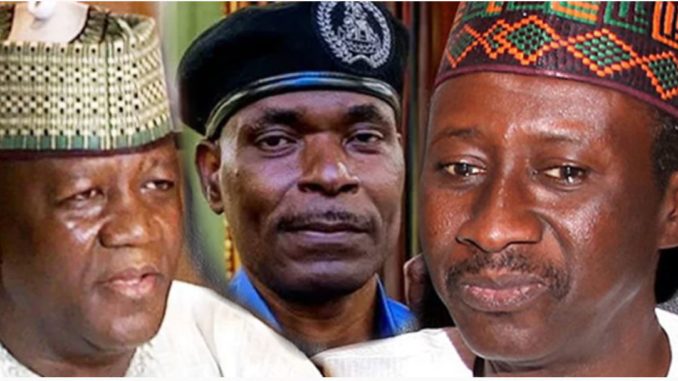
AS the cloud gathers for the general election, all Nigerians in unlawful possession of arms and ammunition have been ordered to surrender them to the nearest police station or face the consequences for non-compliance. Proliferation of arms is an existential concern in the country, becoming eerier with increasing disquiet within security circles.
The directive from the acting Inspector-General of Police, Mohammed Adamu, is pursuant to the Firearms Act 2004, which prohibits certain categories of arms and ammunition in the hands of individuals and unlawful possession of lethal weapons. The order also emphasised that the issuance of new firearms licences had been suspended throughout the country. Accordingly, State Commissioners of Police have been ordered to set up arms mop-up teams.
Indeed, Adamu has cause to worry. After a meeting of the security chiefs last October, the Minister of Defence, Mansur Dan-Ali, said they were concerned that some disgruntled elements were stockpiling arms with the intention of taking the law into their own hands at the slightest opportunity. Again, the Nigeria Governors’ Forum, chaired by the Governor of Zamfara State, Abdulaziz Yari, expressed the same fears to the National Security Adviser, Babagana Monguno, recently, when they met on how to work in concert to neutralise the threat. In a statement, the Force spokesman, Frank Mba, said the police hierarchy had “intelligence indicating the presence of huge quantity of arms in unlawful possession of some Nigerians, the desperation of some citizens to acquire more arms, and the continued proliferation of illicit weapons in the country….”
With reported killings at political rallies in Lagos, Bayelsa and Ondo states and the Nigerian Army’s arrest of a dozen political thugs in Sokoto State with guns, machetes, daggers and other weapons of war during a stop-and-search patrol, coupled with increasing violence and bloodbath from kidnapping, armed robbery, cattle-rustling and secret cults clashes in virtually every part of the country, police response should be more methodical and result-oriented. So far, they have offered knee-jerk reactions. It is unfortunate that since the United Nations Regional Centre for Peace and Disarmament revealed in 2012 that 350 million illicit small and light weapons out of 500 million circulating in West Africa were in Nigeria, the authorities have not demonstrated any sense of urgency in dealing with this bizarre issue.
Apparently, the mere 9,657 illegal arms and 26,994 ammunition recovered in the previous operation amount to nothing, given the Service Chiefs and governors’ alarm on the influx of arms into Nigeria. In fact, in their desperation to maintain law and order in their states, some governors have been granting confessed criminals amnesty, for returning a few arms, especially in the South. Zamfara State has since 2017 been a theatre of banditry. In November 2018, 16 police officers who were members of the cattle anti-rustling team, were killed by bandits. The deployment of the military in the state thrice in the past two years by President Muhammadu Buhari has not mitigated the disaster.
Therefore, Adamu has to formulate a different template from those of his predecessors if he hopes to make any impact in demobilising non-state actors, who undermine the country’s internal security. The battle should be taken to these felons: recover their arms, arrest and prosecute them in line with our extant laws instead of waiting for them to willingly return their unlawful possession. Apart from illegal possession, criminals harbour high-calibre weapons such as AK 47 rifles, pump action rifles, General Purpose Machine Guns, rocket launchers, grenades, Improvised Explosive Devices and Heckler and Koch MG4.
How these weapons enter the country undetected is a serious security breach that underlines the failure of the security agencies to discharge their responsibilities. Something is wrong with a system where the police and military would get intelligence that some individuals had stockpiled weapons without acting swiftly to interdict them.
The Transparency International, in its report in June 2018, offered an insight into why this aberration has endured. It said that militia and sundry groups bribe officials to smuggle weapons into the country. Nothing could be more evidential than the truck carrying a 40-foot container with 661 pump action rifles, intercepted by a Federal Operations Unit Squad of the Nigeria Customs Service, after it was cleared by Customs at the Tin Can Island ports, Lagos, as “steel doors.” This was in January 2017. One of the suspects, Mahmud Hassan, confessed in court that he paid a N1 million bribe to a State Security Service official for them to have their way. In May of the same year, another contraband of 1,100 rifles also arrived through the Lagos ports.
This is a country where herdsmen move about with AK 47 rifles unchallenged by security agencies; a suspect of unlawful possession of a gun only meant for the security agencies is set free in court on technical grounds; and the trials of importers of these merchandise of death are stifled by a corrupt judicial process. Nigeria cannot make any serious dent on this perversity that imperils the lives of the people, the police and even the military until granite counter-measures are put in place and clinically enforced.
Certainly, Adamu’s order is not new. The immediate past IG, Ibrahim Idris, had in March last year, initiated a similar campaign. What is required now is the demonstrable capacity to follow through. Even recovered arms are sold back to criminals by some bad eggs in the police. But in Kenya, Venezuela and other countries, such contraband is destroyed publicly for accountability purposes. Nigeria has to adopt this system, tighten its land borders and enforce its writ. Without adopting a vigorous crime-and-punishment approach, the country will continue to be mired in the morass of armed violence and avoidable killings whether in Benue, Plateau, Kaduna, Taraba, Zamfara or elsewhere.
END

Be the first to comment